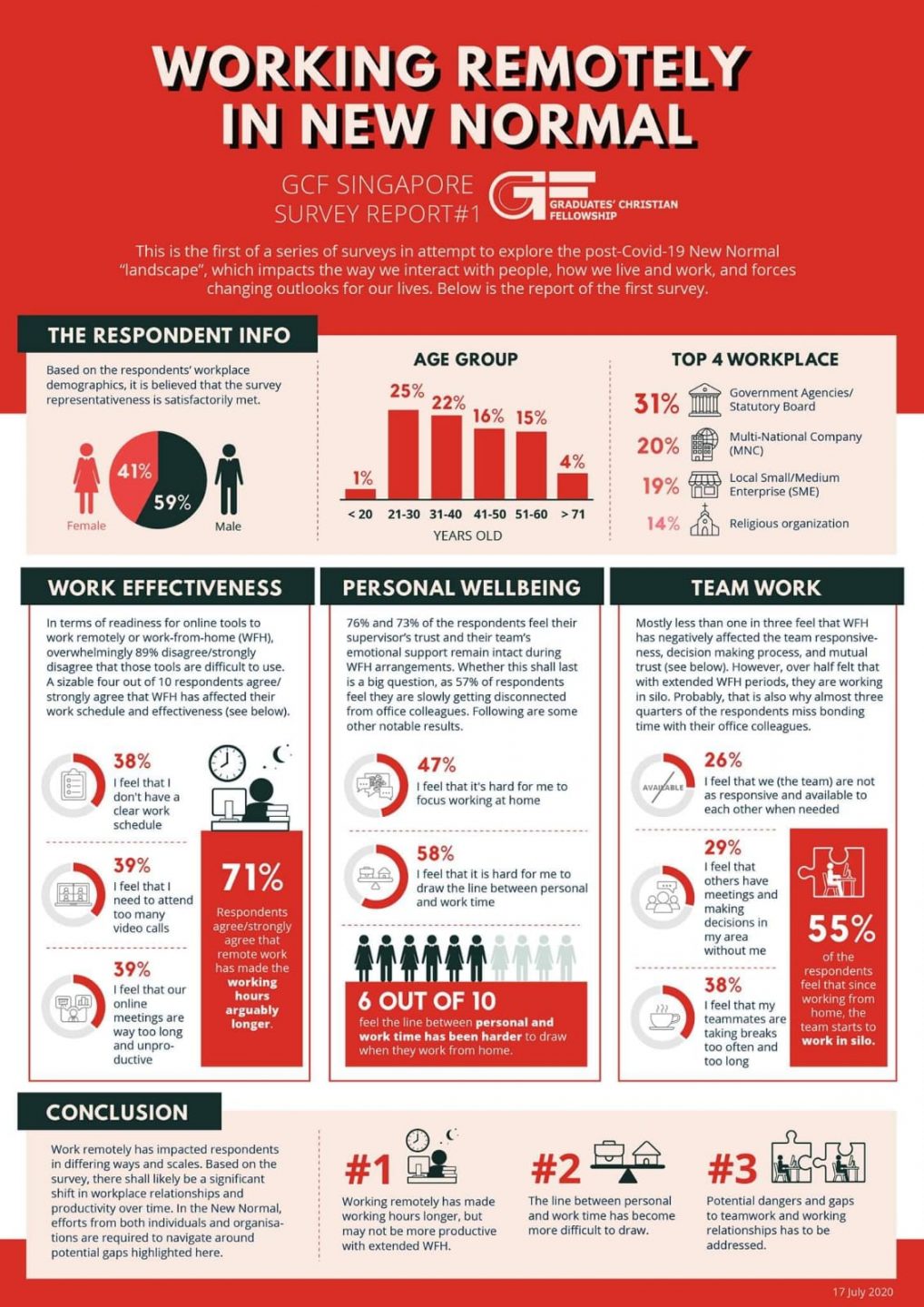People starting to feel less productive, more isolated during WFH season, survey finds
by Gracia Lee // July 24, 2020, 6:30 pm

Photo by Manny Pantoja on Unsplash.
As this season of working from home continues, many are feeling less productive and more isolated as they struggle to strike a new work-life balance, a survey by Graduates’ Christian Fellowship (GCF) has found.
The survey, which was conducted in June, collected 88 responses from students, graduates and friends of GCF Singapore and Fellowship of Evangelical Students (FES) Singapore.

An infographic of the survey results. Photo courtesy of GCF.
It is the first of four surveys that hopes to explore the post-Covid-19 new normal landscape. The other three surveys will focus on how social distancing affects human relationships, how people deal with uncertainties and what faith will look like in a post-pandemic world.
Finding #1: Reduced productivity
While almost 9 in 10 of respondents did not think that online tools were difficult to use, many still felt that working from home has affected work effectiveness.
In particular, about 4 in 10 felt that they did not have a clear work schedule, needed to attend too many video calls and had online meetings that were way too long and unproductive.
To help boost productivity, workers can keep themselves accountable by setting daily targets for themselves.
Almost half felt it was difficult to focus when working from home, while more than 7 in 10 said they still needed to close small pending tasks after the work day ended, making working hours arguably longer.
Given that working from home offers more efficiency, since workers do not need to travel for work and can access online meetings and work almost immediately, this result was “pretty surprising”, said Dr Chew Wee, who co-conducted the survey with Lisman Komaladi, General Secretary of GCF Singapore and FES Singapore.
Dr Tang Hui Kheng, a consultant psychiatrist in private practice, told Salt&Light that there may be various reasons for this drop in productivity, such as a change in working environment, a lack of routine, as well as anxiety and uncertainty about the pandemic.
To help boost productivity, workers can keep themselves accountable by setting daily targets for themselves at the start of the day, she said.
They can also set aside a dedicated working space or table to help them focus on these tasks, so they are not so easily distracted.
“When you lounge on your bed, on your sofa, trying to work, it is a little bit of a different setting, you feel more relaxed. Because of that, you drift a little bit,” she explained.
Self-discipline is crucial, especially when it comes to staying too long on messaging apps or social media, added Dr Tang.
“At work you will consciously not be on social media for too long because you know that people are around. At home, the boundaries are looser and you can lose track of time, so the best is to just keep that to a minimum (during work hours),” she said.
Finding #2: Blurred work-life boundaries
About 6 in 10 of respondents felt that has been harder for them to draw the line between personal and work time.
Dr Chew, who is also the chairperson of the Engineering and Science Christian Fellowship (ESCF), a sectional group of GCF Singapore, said while this struggle of maintaining work-life balance is not new, this season of working from home has made the struggle more acute.
Organisations “need to rethink whether this WFH amalgamation is a true panacea for post Covid-19 workplaces”.
“Former external locations of the work desk, office space, meeting rooms and canteen are (now) all condensed into familiar home grounds of our home desk, study area, living room and kitchen in work-from-home arrangements,” he said.
Furthermore, with the rise in issues that could entangle with working from home, such as mental health, domestic violence and family conflict, organisations “need to rethink whether this work-from-home amalgamation is a true panacea for post Covid-19 workplaces”, he noted.
To manage such situations, Dr Tang said that it is important for employees and employers to communicate their expectations and circumstances.
This is because while some bosses expect their employees to be in work mode during working hours, that may not necessarily be the case for employees at home when the boundaries are not clear – for example, if they are often interrupted by the needs of young children or elderly parents, she said.
“The celebration of Sabbath is an act of both resistance and alternative.”
In such cases, the employee can set fixed times with his supervisor on when he is available to take calls to avoid being caught at a tricky time, she suggested, adding that there needs to be mutual trust and responsibility.
Dr Chew added that from a Christian perspective, the practice of observing the Sabbath to rest, as well as pacing our work, has become increasingly essential during times like this.
“The current work-from-home arrangement presents an opportunity for Christians to set apart Sabbath as a declaration of our faith in God’s grace to a world in desperate need of inner peace and hope.”
Quoting Walter Brueggemann in his book Sabbath as Resistance: Saying No to the Culture of Now, he added:
“In our own contemporary context of the rat race of anxiety, the celebration of Sabbath is an act of both resistance and alternative. It is resistance because it is a visible insistence that our lives are not defined by the production and consumption of commodity goods … But Sabbath is not only resistance. It is an alternative. It is an alternative to the demanding, chattering, pervasive presence of advertising and its great liturgical claim of professional sports that devour all our rest time.”
Finding #3: Potential dangers in teamwork
The survey results also suggested that workplace interactions and relationships may potentially be strained over extended work-from-home periods, said Dr Chew.
More than half of respondents also felt that the teams they are in have started to work in silo.
While more than 70% of respondents said that their supervisor’s trust and their team’s emotional support remained intact during this season, 57% said they felt that they were slowly getting disconnected from office colleagues.
More than half of respondents also felt that the teams they are in have started to work in silo.
Additionally, 26% felt that their team was not as responsive and available to each other when needed, while 29% felt others had meetings and were making decisions without them.
Almost 4 in 10 felt that their teammates were taking breaks that were too long and too frequent.
“To mitigate breakdowns in communication and workflows, and the accompanying stress level, both management and human resource teams need to work closely with all staff – making this uncertainty-filled transition into an opportunity for organisational development,” said Dr Chew.
However, as different employees may have varying perceptions of the changes in their workplace, organisations should “avoid the one-solution-fits-all strategy, and adapt best practices judiciously”, he said, adding that open communication and transparency are crucial.
Here’s how to reassure your children that God is still faithful
We are an independent, non-profit organisation that relies on the generosity of our readers, such as yourself, to continue serving the kingdom. Every dollar donated goes directly back into our editorial coverage.
Would you consider partnering with us in our kingdom work by supporting us financially, either as a one-off donation, or a recurring pledge?
Support Salt&Light



